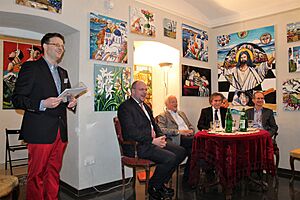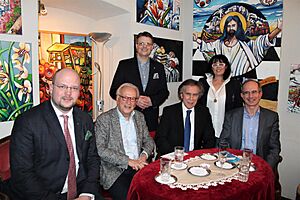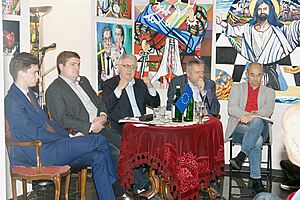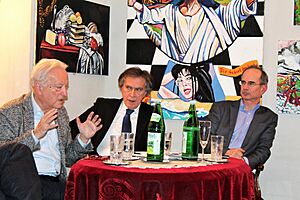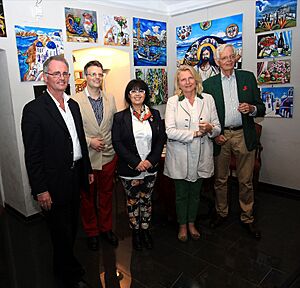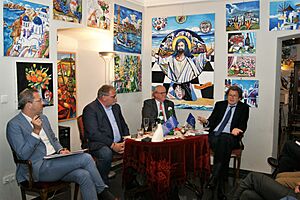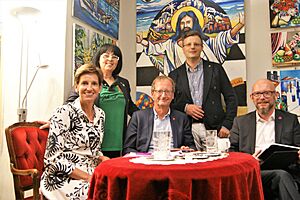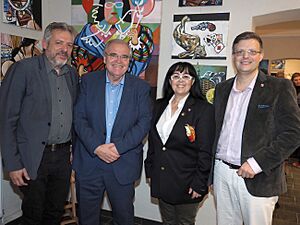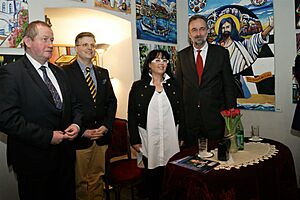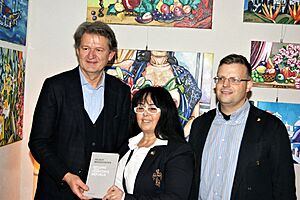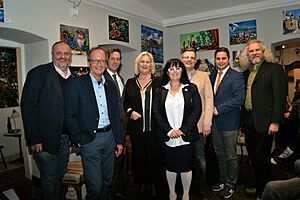Dialog im Kamptal facts for kids
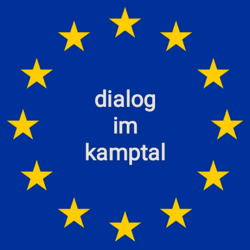 |
|
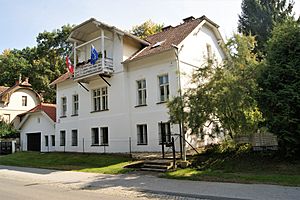
Art studio Gräff, Gars am Kamp, Austria
|
|
| Formation | May 2019 |
|---|---|
| Founder | Georgia Kazantzidu and Matthias Laurenz Gräff |
| Type | Non-partisan platform |
| Legal status | Foundation |
| Headquarters | Art studio Gräff/House Kazantzidu in Gars am Kamp, Austria |
|
Official language
|
German |
|
Organisators
|
Georgia Kazantzidu and Matthias Laurenz Gräff |
| Website | https://www.matthiaslaurenzgraeff.com/dialog-im-kamptal/ |
The Dialog im Kamptal (which means Dialogue in Kamptal) is a special meeting place in Gars am Kamp, Austria. It was started in 2019. It's a private group that helps people talk about important topics like European and Austrian politics and history. It's like a "citizens' salon" where everyone can share ideas.
Contents
History of the Dialogue
The Dialogue in Kamptal was started by Georgia Kazantzidu. She and Matthias Laurenz Gräff organize it. The meetings happen at the Art studio Gräff/House Kazantzidu in Gars am Kamp. This place was chosen to show how important art is in European politics and society. It also shows how close the dialogue is to everyday people.
Both Georgia Kazantzidu, who is from Greece, and Matthias Laurenz Gräff wanted to start this dialogue. They believe in shared European history and values from Ancient Greece. They also believe in humanism and everyone's responsibility in society.
The Dialog im Kamptal began around the time of the European Parliament elections in 2019. The goal was to teach people about Europe and make them more interested in the European Union. It also aimed to highlight Europe's history, values, and goals. The group wanted to encourage pro-European ideas in the Kamptal and Waldviertel regions.
Since then, the platform has become a place for learning and discussion. It covers politics, diplomacy, and different cultures. It tries to explain social issues and help people understand our diverse society better. It also encourages cooperation and sharing ideas.
How the Dialogues Work
The events do not have set dates. However, they usually happen two to three times a year. Dialogues also take place before national and European elections. People who participate are often candidates or representatives from different political parties.
At each Dialogue, politicians from different parties and diplomats are invited. They discuss a specific topic. They talk about their goals, topics, and even books, guided by a moderator. The dialogue usually ends with the audience joining in. They can ask questions and discuss facts with the speakers.
Past Dialogues and Topics
2019 Dialogues
Europe Dialogue in Kamptal
The first dialogue happened on May 6, 2019. This was before the European Parliament elections. The topic was the European Union. This subject was important because of the upcoming elections. It was also a common idea that different parties could agree on.
The discussion covered several key points. These included the European idea of peace and uniting people. They also talked about improving the EU's system and its economic strength. The need for people to know more about the EU and its achievements was also discussed. Finally, the importance of voting was a main topic.
The discussion included:
- Wolfgang Petritsch, an ambassador and former international representative.
- Douglas Hoyos-Trauttmansdorff, a member of the National Council of Austria.
- Werner Groiß, a politician.
- Christian Schuh, a politician.
- Walter Kogler-Strommer, a politician.
- Josef Wiesinger, the presenter.
Dialogue in Kamptal: Bringing Politics Closer
The next dialogue took place on September 10, 2019. This was before the 2019 Austrian legislative election. Top candidates from the Waldviertel region participated.
The discussion included:
- Martina Diesner-Wais (ÖVP)
- Alois Kainz (FPÖ)
- Martin Litschauer (Die Grünen)
- Günter Steindl (SPÖ)
- Herbert Kolinsky (NEOS)
- The physicist Werner Gruber as a special guest.
- Josef Wiesinger, the presenter.
2020 Dialogues
Politics and Diplomacy in the 21st Century
The third dialogue was on January 27, 2020. The topic was politics, diplomacy, and cultural exchange in our century. The dialogue looked at new challenges in these areas. A main topic was the rise of nationalism today. They discussed its features and problems, especially within the European Union.
The dialogue included:
- Emil Brix, an ambassador and director of the Diplomatic Academy of Vienna.
- Hannes Swoboda, former president of a group in the European Parliament.
- Philipp Jauernik, a historian.
- Eric Frey from Der Standard, the presenter.
Dialogue of Books: Finding Common Ground
The fourth dialogue happened on September 12, 2020. This dialogue covered many topics. These included the role of diplomacy and new challenges in security. They also discussed how globalization and geopolitics affect security. Another topic was using new energy sources for travel and protecting the environment. The challenges of high-level diplomatic service were also presented.
The dialogue included:
- Karin Kneissl, former Minister of Foreign Affairs.
- Michael Breisky, an ambassador.
- Georg Vetter, a politician.
- Georgia Kazantzidu, the organizer, as presenter.
Our Europe: Who Are We and Where Are We Going?
The fifth dialogue took place on September 28, 2020. Topics included how Europe has developed. They also discussed the COVID-19 crisis and migration. The importance of Europe as a business location was also a key point.
The dialogue included:
- Erhard Busek, former Vice-Chancellor of Austria.
- Sebastian Prinz von Schoenaich-Carolath, an ambassador.
- Helmut Brandstätter, a member of the National Council of Austria.
- Willi Mernyi, managing director of Austrian trade unions.
- Daniel Lohninger, chief journalist of the NÖN, as presenter.
2021 Dialogues
NEOS Party in Conversation
The sixth dialogue was on September 13, 2021. This was the first "Parties in Conversation" salon. It focused on the NEOS Party in Lower Austria. They presented their ideas and goals. These include clean politics, fighting corruption, and fair chances in education.
The dialogue included:
- Indra Collini, NEOS Lower Austria spokeswoman.
- Helmut Hofer-Gruber, a NEOS member of the Landtag of Lower Austria.
- Bernd Pinzer, NEOS club director of Lower Austria, as presenter.
Importance of Justice and the Austrian Constitution
The seventh dialogue took place on October 26, 2021. This event was part of the "Personalities in Conversation" salon. It focused on the Austrian justice system. This topic was chosen because of its importance in society. It also marked "101 Years of the Austrian Federal Constitution."
Wolfgang Brandstetter, a former Vice Chancellor and justice minister, spoke. He talked about how independent the justice system is. He also discussed trust and fairness in Austrian courts.
The dialogue included:
- Wolfgang Brandstetter, former Vice Chancellor of Austria and constitutional judge.
- Werner Groiß, the presenter.
2022 Dialogues
Karl von Habsburg: 100 Years of Paneuropa
The eighth dialogue was on March 9, 2022. This was the first "European Cooperation" salon. The main speaker was Karl von Habsburg. He is the head of the former Austrian imperial family, Habsburg. He is also the President of the Paneuropean Movement Austria.
The event discussed "100 Years of Paneuropa." This is the oldest European unification movement. They also talked about Central Europe's history. The discussion covered what Paneuropa can do for European unity. Important global issues, like the Russian invasion of Ukraine, were also discussed.
The dialogue included:
- Karl von Habsburg, President of the Pan-European Movement Austria.
- Rainhard Kloucek, Secretary General of the Pan-European Movement Austria, as moderator.
Helmut Brandstätter in Conversation
The ninth dialogue took place on December 19, 2022. This was the second "Personalities in Conversation" salon. Helmut Brandstätter, a politician from NEOS, was the speaker. He discussed problems in Austrian politics and possible solutions.
As his party's foreign policy spokesperson, he also talked about European politics. He discussed the Russian invasion of Ukraine. He also addressed Austria's role in it and questions about neutrality and security.
The dialogue included:
- Helmut Brandstätter, a member of the National Council of Austria.
2023 Dialogue
Lower Austria State Election Discussion
The tenth dialogue was on January 19, 2023. This event was held before the 2023 Lower Austrian state elections. Candidates from the parties in the state parliament participated.
The discussion included:
- ÖVP: Lukas Brandweiner, member of the National Council of Austria.
- SPÖ: Elvira Schmidt, member of the Landtag of Lower Austria.
- FPÖ: Reinhard Teufel, member of the Landtag of Lower Austria.
- DIE GRÜNEN: Martin Litschauer, member of the National Council of Austria.
- NEOS: Helmut Hofer-Gruber, member of the Landtag of Lower Austria.
- Martin Kalchhauser, a journalist from NÖN, as presenter.
 | James Van Der Zee |
 | Alma Thomas |
 | Ellis Wilson |
 | Margaret Taylor-Burroughs |


